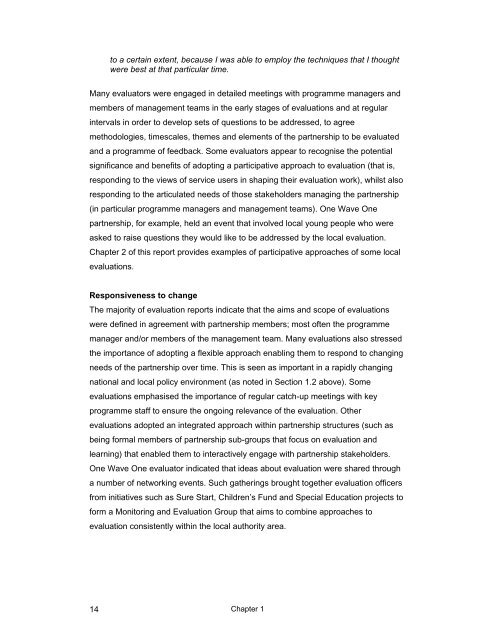Local Evaluation of Children's Services Learning from the Children's ...
Local Evaluation of Children's Services Learning from the Children's ...
Local Evaluation of Children's Services Learning from the Children's ...
- No tags were found...
You also want an ePaper? Increase the reach of your titles
YUMPU automatically turns print PDFs into web optimized ePapers that Google loves.
to a certain extent, because I was able to employ <strong>the</strong> techniques that I thoughtwere best at that particular time.Many evaluators were engaged in detailed meetings with programme managers andmembers <strong>of</strong> management teams in <strong>the</strong> early stages <strong>of</strong> evaluations and at regularintervals in order to develop sets <strong>of</strong> questions to be addressed, to agreemethodologies, timescales, <strong>the</strong>mes and elements <strong>of</strong> <strong>the</strong> partnership to be evaluatedand a programme <strong>of</strong> feedback. Some evaluators appear to recognise <strong>the</strong> potentialsignificance and benefits <strong>of</strong> adopting a participative approach to evaluation (that is,responding to <strong>the</strong> views <strong>of</strong> service users in shaping <strong>the</strong>ir evaluation work), whilst alsoresponding to <strong>the</strong> articulated needs <strong>of</strong> those stakeholders managing <strong>the</strong> partnership(in particular programme managers and management teams). One Wave Onepartnership, for example, held an event that involved local young people who wereasked to raise questions <strong>the</strong>y would like to be addressed by <strong>the</strong> local evaluation.Chapter 2 <strong>of</strong> this report provides examples <strong>of</strong> participative approaches <strong>of</strong> some localevaluations.Responsiveness to changeThe majority <strong>of</strong> evaluation reports indicate that <strong>the</strong> aims and scope <strong>of</strong> evaluationswere defined in agreement with partnership members; most <strong>of</strong>ten <strong>the</strong> programmemanager and/or members <strong>of</strong> <strong>the</strong> management team. Many evaluations also stressed<strong>the</strong> importance <strong>of</strong> adopting a flexible approach enabling <strong>the</strong>m to respond to changingneeds <strong>of</strong> <strong>the</strong> partnership over time. This is seen as important in a rapidly changingnational and local policy environment (as noted in Section 1.2 above). Someevaluations emphasised <strong>the</strong> importance <strong>of</strong> regular catch-up meetings with keyprogramme staff to ensure <strong>the</strong> ongoing relevance <strong>of</strong> <strong>the</strong> evaluation. O<strong>the</strong>revaluations adopted an integrated approach within partnership structures (such asbeing formal members <strong>of</strong> partnership sub-groups that focus on evaluation andlearning) that enabled <strong>the</strong>m to interactively engage with partnership stakeholders.One Wave One evaluator indicated that ideas about evaluation were shared througha number <strong>of</strong> networking events. Such ga<strong>the</strong>rings brought toge<strong>the</strong>r evaluation <strong>of</strong>ficers<strong>from</strong> initiatives such as Sure Start, Children’s Fund and Special Education projects t<strong>of</strong>orm a Monitoring and <strong>Evaluation</strong> Group that aims to combine approaches toevaluation consistently within <strong>the</strong> local authority area.14Chapter 1
















